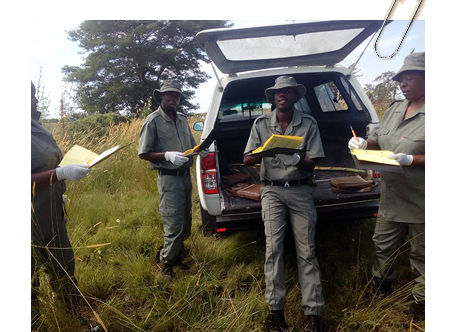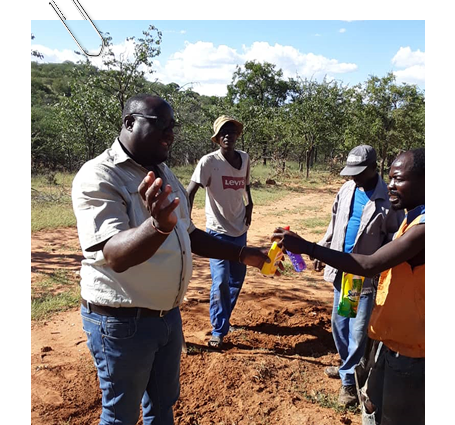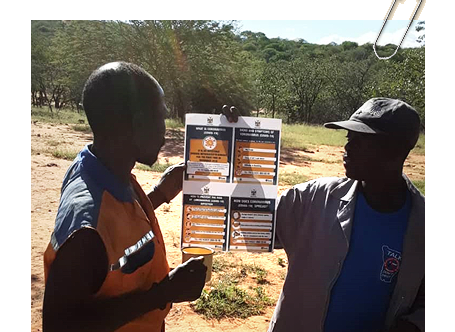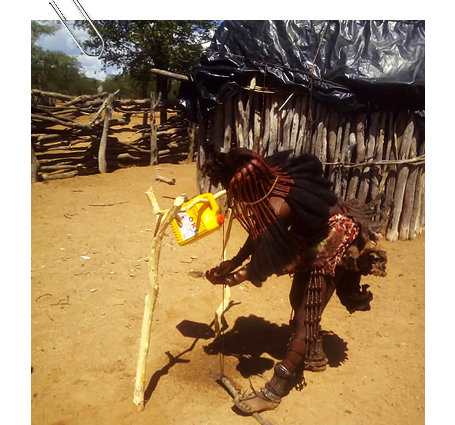IRDNC during the COVID-19 pandemic
The COVID-19 pandemic and subsequent lockdowns and travel bans has led to adverse economic effects globally. In Namibia, the tourism sector which community-based organizations in Namibia depend on for income has been severely affected. Conservation and tourism activities came to an instant halt, including essential anti-poaching activities and wildlife monitoring.
The economic impacts of the global pandemic on conservancies include:
- Loss of approximately US$11 million in annual benefits, of which tourism accounts for more than 90 percent. Losing these benefits will jeopardize the ability of conservancies to pay:
- 700+ community game guards who play a critical role in conservancies—mitigating human-wildlife conflict, monitoring wildlife movements, and identifying and reporting poaching incidents. As residents of conservancies, the income from each community game guard’s job often supports an extended household of 10 people.
- 300 additional conservancy staff members including managers, bookkeepers, drivers, etc.
- In the short-term, the ability of 61 joint venture tourism lodges and 48 hunting concessions to pay the wages of over 1,400 community employees will be jeopardized; in the longer-term, some of these critical businesses may close permanently.
- The loss of 2,700 jobs in dramatically increased poverty in conservancies. Previously employed individuals and their families will be forced to rely more heavily on natural resources (likely to include poaching wildlife) to sustain their livelihoods.
Despite the national lockdown due COVID-19, IRDNC continued working with communities in rural areas to render essential conservation and development services in the Kunene and Zambezi regions. This included assisting conservancies in renegotiating tourism agreements with the Joint Venture partners where necessary.
In response to COVID-19, IRDNC also immediately teamed up with the Ministry of Health and Social Services (MHSS) and the Ministry of Environment, Forestry and Tourism (MEFT), and the regional government to fight against the spread of the virus in rural communities, whilst taking maximum precautionary measures for both our staff and the partners we engage with. Field activities were coupled with the distribution of COVID-19 awareness literature translated into local languages, sanitary materials, as well as demonstrations to communities on hand cleaning, use of disinfectant and other safety measures.
With donations from the Namibian Chamber of the Environment (NCE), MHSS and MEFT, our Kunene team distributed 6,463 sanitary detergents and 369 tippy taps to 147 villages with approximately 7,770 people reached, while over 300 rural villages received COVID-19 posters in Zambezi region. Our Assistant Director, Janet Matota, formed part of the Zambezi Regional Disaster Risk Management’s Communication committee to disseminate awareness information through radio and other media.
In Kunene, IRDNC’s Cash-for-Work Programme was maintained and prioritised during the COVID-19 pandemic to assist communities and conservancies whose jobs and income are in jeopardy due to the pandemic. Funded by B2Gold through the Namibian Chamber of the Environment, the programme is part of Drought Relief efforts set up as a temporary employment option for conservancy members to work on community-identified projects, such as clearing of tourism access tracks, potential picnic and campsites and clearing routes utilized for wildlife road counts.
IRDNC managed to raise relief funds in close collaboration with the MEFT to ensure the continuation of essential conservation activities and to revive the community conservation and the community-based tourism sector, providing funding to cover 80% of the essential field service costs and salaries of its conservancies. Funding has also been procured to assist the private sector joint venture tourism operators in the conservancies to cover some of their salary costs and is also assisting conservancies in renegotiating their contracts with operators, in an effort to ensure that tourism businesses are sustained until they are in a position to recover from the impact of the pandemic. In partnership with conservancies and other Community-Based Natural Resource Management partner organisations, longer term strategies are also developed to facilitate recovery from the pandemic and to build greater resilience against similar events.

- Game guards recording incidents

- Sanitizer distribution in Kunene

- Distribution of COVID-19 awareness posters and sanitation detergents in Kunene Conservancies and Villages.

- Tippy taps in Kunene



